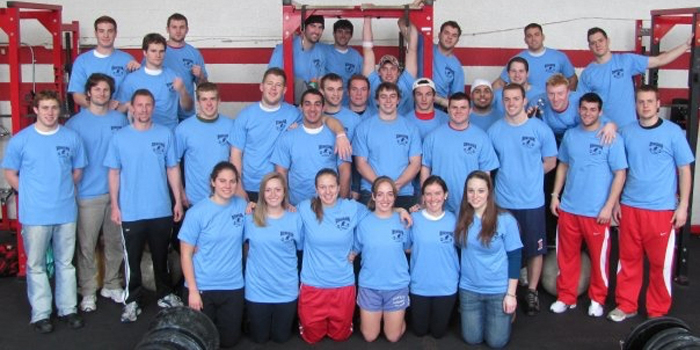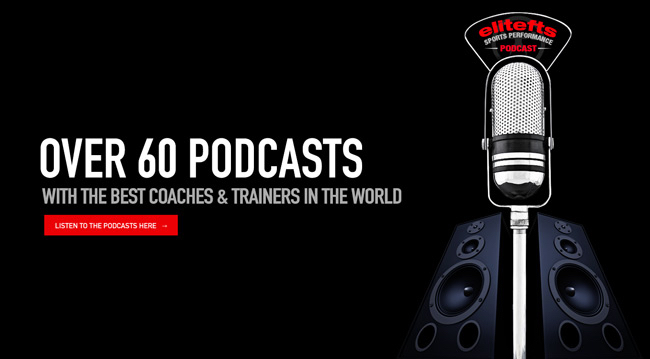
The first time I heard the "Three -isms" was from my old boss and still my mentor, Jack Hatem. He spoke at the 2012 Central Ohio Strength and Conditioning Clinic at Denison University. We had really good line-up that year with coaches like Mike Johnston, JL Holdsworth, Travis Mash, Cam Davidson, Todd Hamer, Eric Hammer, and Greg Pyszczynski just to name a few. Jack spoke on day two about coaching basics and I had every strength coach ask me for a copy of his presentation after. The bulk of the discussion was about the Three -isms that we see as coaches with some of our athletes, interns, and young assistants.
Matthew Kelly in his book Rediscovering Catholicism talks about these three concepts in more detail. Kelly uses them in the context of today's society, but I feel coaches will especially relate to these three in athletics. This is probably due to two separate factors.
- These character flaws are more prominent in young men and women which is the population we see as coaches.
- The repercussions or consequences are more severe for athletes due to so many of their peer depending on them.
Regardless of what population you are teaching, coaching, or mentoring; avoidance of these three behaviors may be the key to success that no one talks about. We as coaches have mastered the art of the cliche' as it relates to sports performance. Arbitrary statements about dedication and desire fall on deaf ears and become nothing more than memes with no substance. It's not as cool to talk about avoiding the popular choices which these "isms" press upon and vague motivational quotes will get more shares.
The three "-isms" impeding success for young people?
Individualism: What's in it for me?
Hedonism: If it feels good, I'll do it.
Minimalism: What is the least I can do?
Each one of these behaviors detract from the one characteristic that separate good from average teams and prevent athletes from reaching their potential. That is, putting the needs of others before their own through a shared suffering and the discipline to uphold their commitment when no one is looking. Cliche'? Probably. But, just think of who it effects when an athlete misses a training session. Those add up. Training hard is not mandatory. Then again, neither is winning.
Individualism
What's in it for me?
No other factor has infected sports that the individual recognition that sometimes accompanies success. As social media becomes a standard part of athletic achievement and recruiting, individual accomplishment will increasingly overshadow team records.
It is a natural desire and human nature to separate oneself among their peers. With every message around young people to separate themselves, it is difficult to counteract that message with ones of selflessness and sacrifice. Head Strength & Conditioning Coach at the University of Iowa, Chris Doyle talks about "countering the recruiting process" once the heavily touted freshmen arrive on campus. Young men and women who have been put on a pedestal and relentlessly courted by grown men and women who need those teenagers in order to stay employed. That courtship must end and the acclimation to the true definition of "sum of it's parts" begins to define the machine.
The issue that rears it's ugly head is the failure of those young men to adapt to being a "wolf in the pack". This adjustment often takes a toll on young men and women who are asked to display qualities that make them standout without the opportunities to truly develop those qualities through mentorship, fellowship, and hardship.
Mathew Kelly may have summed it up best when he says, "Our culture places a very high premium on self-expression, but is relatively disinterested in producing "selves" that are worth expressing."
Hedonism
If it feels good, I'll do it.
Young people often want to have the "freedom" to do what they want. They mistakenly identify freedom with a lack of structure an no accountability. Freedom for adults with people depending on them means something different. Freedom means having the freewill to make the right decision without jeopardizing the values of the decision maker. As Pope John Paul II has said, "Freedom consists not in doing what we like, but in having the right (or the free will) to do what we ought”. That freewill to make unpopular decisions overrides any excuses of irresponsibility based on the bastardization of the word freedom.
Minimalism
What is the least I can do?
This concept will resonate with most coaches. We have all cut corners and have had athletes that will do the same. Some of this behavior is constituted by the ever-so-rising expectations of what a normal work day should look like. Even with longer days, there often isn't enough time in the day to do the best job possible. I lived this while balancing a duel role of Director of Strength & Conditioning and Assistant Football Coach. IN order to perform two full-time job with proficiently, a coach must a lot full-time hours to both. Knowing that strength and football coaches are already at the extreme end of the workweek spectrum. This frustrated me beyond belief. My situation transformed me into a minimalist. The best I can do in the situation I was in sounded like a cop-out no matter how much I can justify it.
"Minimalism is the enemy of excellence and the father of mediocrity. It is one of the greatest philosophical diseases of our age." - Matthew Kelly
There are a couple of strategies I developed as a coach that I still use to day to help combat against minimalism.
Do less better. My priorities have always been: Faith, Family, My Job, My Health. Everything below that was subject to be on the chopping block. I have to ask, "Is this enhancing my relationship with God, my wife, my kids, my dog, my boss, or my co-workers?" If not, cut it. Like Jim Wendler told me a week before my oldest daughter was born, "Everything else moves down the Totem pole."
Are people better because of me and am I a better person because of them? One reason why I feel I will continue to have success as a coach and teacher has nothing to do with talent or intelligence and everything to do with the evaluated experiences I have had. The age-old question, "who have you learned from?" stands out for me. The men and women I have worked for have shaped who I am because of them or in spite of them. Remembering those lessons is an incredible blessing
Asking Why? Having a reason why you are doing something gives you a purpose. Having a purpose gives meaning to what you do. How many times have I taught a lesson or coached a session just wanting to "get through it"? I wrote an article about "winging it" and made a webinar on having a purpose for each session with a "4 step coaching process" just about this subject.
In the end, we all have our own vices and demons we need to fight. These three concept can cripple the culture of a team or business. It's our responsibility to fight these -isms at every turn.
TRAINING
Friday
* I forgot my gym clothes so I had to workout in my work clothes. Awkward.
Barbell RDL
- 225 for 3 sets of 6
supersetted with...
Military Press
- 145 for 3 sets of 6
Close Grip Cable Pull-downs with strap
- 1x15
MONDAY
SS Yoke Bar Squat
- 300 x 3
- 300 x 1 (45 sec rest)
- 300 x 1 (45 sec rest)
- 300 x 1 (45 sec rest)
Fat Bar Bench Press
- 250 x 3
- 250 x 3
- 250 x 3
supersetted with....
- Cable Face Pulls x 20
- Cable Face Pulls x 15
- Cable Push Downs x 20
Articles by Mark Watts
Olympic Lifting for Athletes: Using Static Holds to Improve Technique
Head Games: Training the Neck to Reduce Concussions
The Fastest Sport on Ice: Things You Don't Know About Bobsled
Tips to Crush the Combine Tests
An In-Season Training Guide for Baseball Pitchers
Individual Training in a Team Setting
Off-Season Training for Football (with 8-Week Program)
What is Really Wrong with Strength and Conditioning
Sports Performance Coach Education Series
WATCH: How to Find a Strength and Conditioning Job
WATCH: Becoming a Mentor to Young Coaches
WATCH: The Four-Step Coaching Process
WATCH: 5 Strategies to Perform More Work in Less Time
WATCH: Why Communication is Key to a Better Coaching Career
WATCH: A Better Way to Train High School Athletes
WATCH: How to Implement Auto-Regulatory Training in a Team Setting
WATCH: Pre-Workout Circuits to Optimize Training Time and Maximize Performance
WATCH: Hypertrophy Circuits for Athletes in a Team Setting
Coaches Clinics
WATCH: Overhead Press Progressions
WATCH: Two Bench Press Mechanical Drop-Sets for Hypertrophy
WATCH: Two Lateral Speed Drills with Bands to Improve Change of Direction
WATCH: Adjusting the Glute-Ham Raise to Optimize Your Training
WATCH: Basic Linear Speed Acceleration Drills in a Team Setting
WATCH: Kettlebell Training for Team Sports














1 Comment